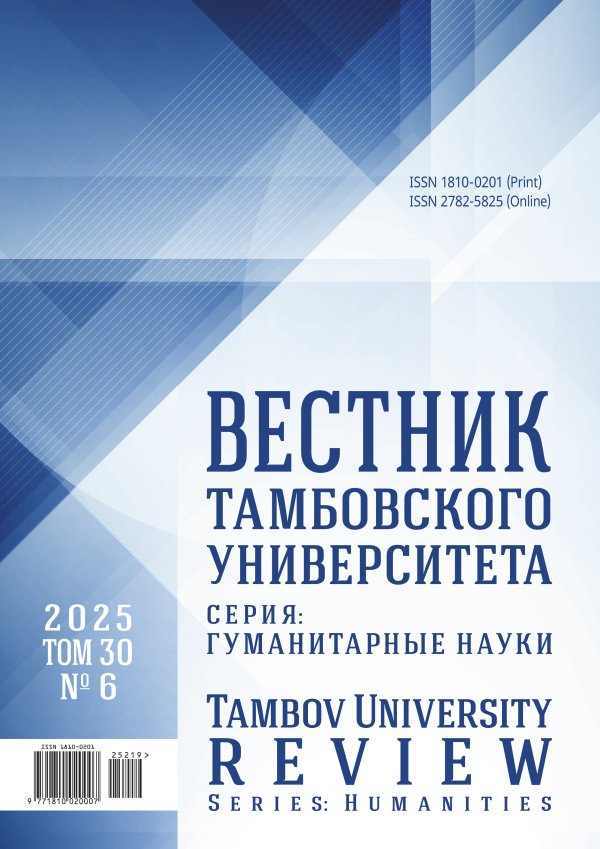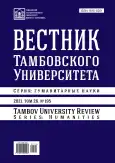Формирование языковой компетентности как условие речевого развития старших дошкольников
- Авторы: Ефимова О.В.1, Шадрина Л.Г.1
-
Учреждения:
- ФГБОУ ВО «Ульяновский государственный педагогический университет им. И.Н. Ульянова»
- Выпуск: Том 26, № 195 (2021)
- Страницы: 260-266
- Раздел: ПЕДАГОГИКА ДОШКОЛЬНОГО ОБРАЗОВАНИЯ
- URL: https://bakhtiniada.ru/1810-0201/article/view/298527
- DOI: https://doi.org/10.20310/1810-0201-2021-26-195-260-266
- ID: 298527
Цитировать
Полный текст
Аннотация
Исследована проблема формирования языковой компетентности детей старшего дошкольного возраста. Отмечено, что формирование языковой компетентности является одним из условий развития личности дошкольника, основой подготовки к обучению в школе. Овладение детьми различными типами связного высказывания предполагает не просто знание особенностей построения текстов различных по структурно-языковым характеристикам, но умение применять эти знания в различных ситуациях коммуникативного взаимодействия. Определены особенности представлений дошкольников о правилах создания описания и умения самостоятельно его составлять. В ходе проведенного исследования выяснилось, что у большинства детей старшего дошкольного возраста отсутствуют представления о специфике описания. Дети не дифференцируют тексты, не могут четко объяснить разницу между рассказом и описанием, не понимают значения качественного описания для решения коммуникативных задач. Это сказывается и на собственных описаниях детей. Описания детей короткие, слабо структурированные, малоинформативные, изобилующие ошибками как в последовательности передачи мысли, так и в оформлении мысли средствами языка. Раскрыта технология формирования языковой компетентности. Она представлена в соответствии с этапами речевой деятельности: раскрыто содержание мотивационного этапа, этапа планирования (замысла) описательного высказывания, реализации замысла и контроля за качеством произведенного высказывания.
Об авторах
О. В. Ефимова
ФГБОУ ВО «Ульяновский государственный педагогический университет им. И.Н. Ульянова»
Email: olga65-25-10@mail.ru
ORCID iD: 0000-0003-4112-3739
старший преподаватель кафедры дошкольного и начального общего образования
432071, Российская Федерация, г. Ульяновск, пл. Ленина, 4/5Л. Г. Шадрина
ФГБОУ ВО «Ульяновский государственный педагогический университет им. И.Н. Ульянова»
Автор, ответственный за переписку.
Email: shadrina2007@mail.ru
ORCID iD: 0000-0002-0636-6631
кандидат педагогических наук, профессор кафедры дошкольного и начального общего образования
432071, Российская Федерация, г. Ульяновск, пл. Ленина, 4/5Список литературы
- Караулов Ю.Н. Русский язык и языковая личность. М.: Изд-во ЛКИ, 2010. 264 с.
- Современный образовательный процесс: основные понятия и термины / сост. М.Ю. Олешков, В.М. Уваров. М.: Компания Спутник+, 2006. 191 с.
- Безрукова В.С. Словарь нового педагогического мышления. Екатеринбург:, 1992. 92 с.
- Ландшеер В. Концепция «минимальной компетентности» // Перспективы: Вопросы образования. 1988. № 1. С. 27-34.
- Божович Е.Д. Структура, динамика и механизмы развития языковой компетенции школьников // Психологическая наука и образование psyedu.ru. 2013. № 5. С. 42-52.
- Дружинина М.В., Дергаева С.С., Найденова И.Н. Проблема дидактического обеспечения формирования языковой компетентности у студентов университета // Вестник Северного (Арктического) федерального университета. Серия: Гуманитарные и социальные науки. 2011. № 5. С. 123-128.
- Жданова Е.Ю. Языковая компетентность как основа самостоятельной научно-исследовательской работы студентов // Вектор науки ТГУ. 2015. № 2 (32-1). С. 161-165.
- Ушакова О.С. Развитие речи в дошкольном детстве как педагогическая проблема // Педагогическое образование в России. 2011. № 12. С. 5-13.
- Смольникова Н.Г. Развитие связной речи детей старшего дошкольного возраста // Педагогическое образование в России. 2011. № 12. С. 21-24.
- Смирнова Е.А. Формирование коммуникативной компетенции личности в системе непрерывного образования // Педагогическое образование в России. 2011. № 12. С. 13-17.
- Галкина И.А. Технология формирования коммуникативной деятельности на основе построения разных типов текста в условиях «Детский сад – открытая система» // Вектор науки Тольяттинского государственного университета. Серия: Педагогика, психология. 2012. № 4 (11). С. 63-65.
- Грешных А.А., Рева Ю.В., Яхонтова О.Н. Применение методов проблемного обучения в преподавании учебных дисциплин // Вестник Санкт-Петербургского университета государственной противопожарной службы МЧС России. 2020. № 4. С. 207-210.
Дополнительные файлы










